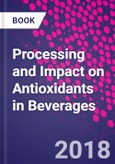Processing and Impact on Antioxidants in Beverages presents information key to understanding how antioxidants change during production of beverages, how production options can be used to enhance antioxidant benefit, and how to determine the production process that will result in the optimum antioxidant benefit while retaining consumer acceptability.
In the food industry, antioxidants are added to preserve the shelf life of foods and to prevent off-flavors from developing. These production-added components also contribute to the overall availability of essential nutrients for intake. Moreover, some production processes reduce the amount of naturally occurring antioxidants. Thus, in terms of food science, it is important to understand not only the physiological importance of antioxidants, but what they are, how much are in the different food ingredients, and how they are damaged or enhanced through the processing and packaging phases.
This book specifically addresses the composition and characterization of antioxidants in coffee, green tea, soft drinks, beer, and wine. Processing techniques considered here include fermentation and aging, high-pressure homogenization, enzymatic debittering, and more. Lastly, the book considers several selective antioxidant assays, such as Oxygen Radical Absorbance Capacity (ORAC) and Trolox Equivalent Antioxidant Capacity (TEAC) assays.
Table of Contents
Section 1: Composition and Characterization of Antioxidants
1. Anthocyanic compounds and antioxidant capacity in fortified wines
2. Endogenous antioxidants and antioxidant activities of beers
3. Antioxidants in coffee
4. Antioxidant Capacity of Green Tea (Camellia sinensis)
5. Antioxidant capacities of herbal infusions 6. Antioxidant capacity of soft drinks
Section 2: Effects of Production and Processing
7. Anti-oxidants in wine during fermentation
8. Effects of aging on the antioxidant capacity of red wines
9. Effects of varieties and growing conditions on antioxidant capacity of coffee
10. Effects of preparation techniques on the antioxidant capacity of coffee brews
11. Applications of Enzymes in Processing Green Tea Beverages: Impact on antioxidants
12. Antioxidant capacity of tea: Effect of processing and storage
13. Antioxidant Quality of Tea (Camellia sinensis) as Affected by Environmental Factors
14. Antioxidants of Rooibos beverages: Role of plant composition and processing
15. Antioxidant activity of mate tea and effects of processing
16. Antioxidants in goji berry juice (Lycium barbarum) and effects of processing steps
17. Acai (Euterpe oleracea Mart.) liquefied pulp for drinking and their antioxidant capacities during processing
18. The impact of processing and storage in the (poly)phenolic fraction of pomegranate juices
19. Influence of high-pressure and ultra-high pressure-homogenisation on antioxidants in fruit juice
20. Enzymatic debittering on antioxidant capacity of grapefruit juice
21. Production processes of orange juice and effects on antioxidant components
22. Total antioxidant capacity of flavoured waters
23. Antioxidant activity of soy-based drinks and effects of processing
Section 3: Selective Assays for Antioxidants
24. The CUPRAC methods of antioxidant measurement for beverages
25. The use of Oxygen Radical Absorbance Capacity (ORAC) and Trolox Equivalent Antioxidant Capacity (TEAC) assays in the assessment of beverages antioxidant properties
26. Methodology for the measurement of antioxidant capacity of coffee: A validated platform composed of three complementary antioxidant assays
27. Off-line HPLC integrated to total antioxidant capacity measurement of beverages
28. HPLC assays for antioxidant assays of beverages
29. Analytical methods for determination of polyphenols in beer
30. Deriving a global antioxidant score for commercial juices by multivariate graphical and scoring techniques: applications to blackcurrant juice








